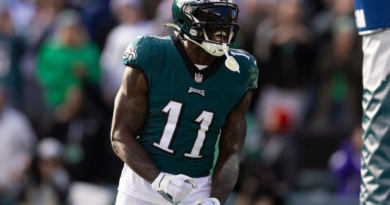Introducing … the chitter: How Padres' Estrada invented a new pitch and made history
JEREMIAH ESTRADA‘S ASCENSION from fringe major leaguer to one of baseball’s most dominant relief pitchers began last December at the San Diego Padres‘ biomechanics lab in Point Loma.
It was mere weeks after the Chicago Cubs had outrighted him off their 40-man roster and several months before his arm would round into proper shape for the 2024 season. Ruben Niebla, Estrada’s new pitching coach, wanted to see him throw in hopes of identifying a pitch that might complement his dynamic-yet-overused four-seam fastball.
They tried cutters, curveballs, changeups and sliders, continually altering the grips on most of them, and then Estrada unveiled the pitch that would change the trajectory of his entire career: a split-changeup, one he developed out of desperation and now sheepishly calls a “chitter.” He held it with an altered version of what’s called a “Vulcan” grip, lodging the baseball between his middle and ring fingers, and Niebla didn’t think he could command it. Then he threw it. It traveled in the mid-80s with hellacious sink and arm-side run. The first remark came from the catcher:
“Holy s—.”
Then Estrada threw another one.
“I was like, ‘Oh god,'” Niebla said. “I looked at the numbers, the characteristics, and I was like, ‘That’s actually not bad. Do it again.'”
What was initially supposed to be a 15-pitch bullpen session stretched out to about 70. By the end of it, Niebla became convinced that Estrada, 25, had identified the type of secondary offering he had spent his entire career searching for.
“He said, ‘OK, your splitter’s your f—ing pitch,” Estrada recalled. “It felt good because I worked hard for that pitch. I made that pitch.”
Estrada compiled a mere 40 professional innings in the four years that followed getting drafted out of high school in Palm Desert, California, in 2017. A forearm injury that wouldn’t heal led to Tommy John surgery. A scary bout with COVID-19, in which he lost more than 40 pounds and nearly lost his life, followed. The next two seasons, spent in the Cubs organization, were middling, remarkable mostly for Estrada’s frustration in his search for something with spin.
Now he has emerged as one of the most unlikely success stories of the season, setting an expansion-era record with 13 consecutive strikeouts last month and carrying a 0.86 ERA. He has stabilized the back end of the Padres’ bullpen. And he has honed in on a three-pitch mix — the fastball he always had, the slider the Padres corrected and the split-change Estrada practically invented — that is baffling hitters.
“I’ve worked my butt off for this,” Estrada said. “I’ve been through a lot to be in this situation, to be here — but I feel like I’m still fighting.”
ONE DAY IN August 2021, Estrada woke up on the floor of his hotel room in Myrtle Beach, South Carolina, with paramedics hovering over him. He wasn’t sure how he got there; all he knew was he couldn’t breathe.
An initially mild case of COVID-19, in which he lost his senses of taste and smell but felt nothing more than drowsiness, had quickly grown severe. Days earlier, Estrada vomited so often over a 24-hour stretch that he set up a makeshift bed inside his bathtub so he wouldn’t stray far from the toilet. When he was checked into the hospital later that day, he said, “my hands locked up like a dinosaur because I was so dehydrated.”
He was discharged quickly that day, but upon returning home he still suffered from shortness of breath and so much cloudiness he couldn’t see his iPhone screen. He used Siri to communicate with his father in California and told him to call an ambulance. When the paramedics got to him, his oxygen saturation levels had dropped to 70%. His prospects only grew dimmer when he arrived back at the hospital.
“They called my dad and said, ‘It’s not looking good,'” Estrada recalled. “‘Your son’s got pretty much like a day.'”
Estrada, who was not vaccinated, doesn’t remember how long his last hospital stay extended. All he remembers is he woke up one morning and his nose felt cold, which doctors took as a sign that he might be able to breathe on his own again. He suddenly had the stomach for brown-sugar graham crackers and nothing else. He began to sit up. Eventually he was cleared to return home, by which point his weight had dropped from 215 to 172.
Estrada’s sense of smell had returned in six weeks, but he lost his taste for a full year. His short- and long-term memory was so bad he spent the ensuing weeks unable to recall what he went through. The brain cloudiness kept him from sleeping for more than three hours at a time. He spent the better part of two months locked in his room, scared to even leave it. Doctors initially diagnosed him with myocarditis and pneumonia, among other ailments, Estrada said.
It wasn’t until around the start of spring training in 2022 that he began to feel like himself again.
“The only step that I missed from COVID, of something that I could’ve gotten, was just dying,” Estrada said. “That was it. That was all that was left.”
WHEN THE 2022 season began, Estrada was a 23-year-old pitching in A ball. He had spent the entirety of his first full season in 2018 rehabbing a sprained ulnar collateral ligament and most of 2019 recovering from Tommy John surgery. The pandemic wiped out the entirety of the 2020 minor league season, and Estrada’s bout with COVID spoiled the tail end of 2021. His first day of spring training in 2022 consisted of nothing more than a 10-minute jog. It was enough.
“I’m not lying — every single ounce of my body was sore from that,” Estrada said. “I could not move the next day.”
Estrada nonetheless advanced through three minor league levels that summer, earning a late-season call-up to the major leagues. He entered 2023 on the fringes of the Cubs’ major league roster, but he was still far from fully formed. The team saw him as a fastball-slider pitcher, Estrada said, discouraging him from throwing the changeup and curveball he was more accustomed to. He became overly reliant on his fastball, making him far too predictable.
Estrada recalls an outing on May 23, 2023, that still haunts him. He entered a bases-loaded, no-out situation in the sixth inning. New York Mets first baseman Pete Alonso reached on a fielder’s choice and began to yell toward the next batter, Daniel Vogelbach: “Fastballs! Fastballs! Fastballs!” Vogelbach proceeded to see only fastballs and drove the third one to the warning track for a sacrifice fly.
Shortly thereafter, the Cubs attempted to teach Estrada a splitter similar to the one thrown by veteran reliever Mark Leiter Jr. But Estrada couldn’t grasp the pitch. The ball never felt comfortable between his index and middle fingers. He often threw bullpen sessions to try to figure it out and then appeared in games later that afternoon. His fastball velocity dropped. Any feel he had for his slider dissipated. Attempts to throw a sweeper never materialized. But he kept searching.
“I don’t give up,” Estrada said. “If I can’t figure something out, I’m going to want to figure it out. I didn’t know how to tell them, ‘I don’t want to do this.’ I didn’t want them to be mad because I know they want what’s best for me. But there was a point where I was sick of it. I was annoyed.”
Estrada posted an 11.77 ERA in a 13-game stretch in Triple-A from June 16 to Aug. 3. He had compiled 33 innings between Triple-A and the major leagues and issued 36 walks by that point. Rather than accept a demotion to Double-A, Estrada said he convinced the Cubs to send him to their pitching lab in Mesa, Arizona. He wanted to throw as many bullpens as possible in hopes of figuring something out, doing so under the tutelage of pitching coordinator Tony Cougoule.
For the better part of a month, the two experimented with a cutter and a gyro and pored through videos of how Stephen Strasburg and Eric Gagne threw their changeups. Eventually they settled on a “Vulcan” grip similar to Gagne’s, in which the baseball is lodged between the middle finger and ring finger. After some tinkering, Estrada figured out a way to get a proper feel for the pitch — by placing his ring finger atop a seam, curling his middle and index fingers into the side of the ball and telling himself to release it like he would his fastball.
“I threw one and it worked,” Estrada said. “It was like a light bulb went off.”
THE CLIP OF Estrada talking about his “chitter” grip during a recent MLB Network appearance prompted kids from all over the world to fill up his social media feed with videos of them attempting to replicate it. For Estrada, it took months to perfect. Shortly after discovering the pitch, Estrada carried a baseball with him everywhere he went and held it that way whenever his right hand was free — in bed before falling asleep, in the bathroom while brushing his teeth, in the driver’s seat of his car when a red light came on, at a restaurant while waiting for his order to come out.
He only threw the pitch a handful of times upon returning to Triple-A near the end of the 2023 season — nowhere near often enough for the Cubs to grasp its impact. They outrighted Estrada off the 40-man roster on Nov. 1, the night of his 25th birthday. Five days later, the Padres, intrigued by the characteristics of his fastball, plucked him off waivers. Roughly a month after that, during an extended bullpen session with Niebla, Estrada found what he had been longing for — a connection.
“We were having fun,” Estrada said. “That’s when you know you have, like, a true relationship. It clicked.”
Estrada didn’t allow a run in spring training with the Padres and earned a spot on the active roster for the season-opening series from South Korea. The Padres called him up again near the end of April and have watched him allow just two runs in a stretch of 21 innings, striking out 35 batters and walking seven.
He struck out the last five Cincinnati Reds hitters he faced on May 23, all five New York Yankees on May 26 and all three Miami Marlins on May 28, the most consecutive punchouts since at least 1961. All of them went down swinging. Opponents have gone 4-for-23 with 13 strikeouts against his split-change, but they’re also struggling against the fastball (5-for-38 with 16 strikeouts) and his new slider (1-for-11 with six strikeouts).
The Padres spent much of the season’s first full month wondering how to bridge the gap to their stellar closer, Robert Suarez. Estrada’s emergence has alleviated those concerns.
His journey there taught him something.
“What everybody needs to know, and all athletes, is, ‘When you’re up here, you can either be you, or you can be what people want you to be,” Estrada said. “But only you know yourself. Only you know how your body feels. Only you know how you feel about you. When they told me about that splitter with the Cubs, I wasn’t confident. I was like, ‘I don’t like this. But I’m going to do it because you guys are the f—ing bosses.’
“But now that Ruben has been like, ‘Yeah, that’s your pitch,’ it gave me confidence. It meant everything.”




